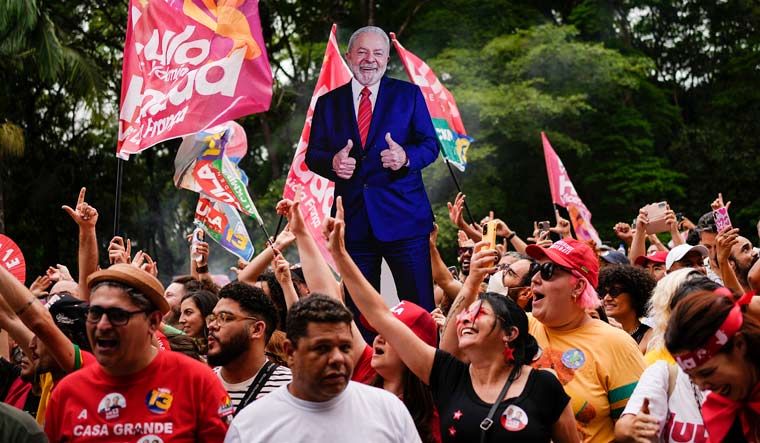By electing Luiz Inacio de Lula as president, the Brazilians have restored the country from the aberrations of the last four years. Brazil is back to civilisation. Vulgar and crude words will no longer be heard in presidential remarks and cabinet meetings.
President Lula will resume his pragmatic and balanced mix of pro-poor and market-friendly policies. He will bring out many more millions of people from under the poverty line, as he did before with his signature Bolsa Familia program. The Amazon can now breathe freely. The indigenous people will feel safer.
The young Brazilian democracy—restored after the end of military dictatorship in 1985—has been saved from the coup-mongering Bolsonaro who did not hide his yearning for the bad old days of brutal dictatorship. The country’s democracy has now become stronger after having successfully withstood his anti-democratic attacks. This is an inspiration for the other democracies of Latin America.
Although 49.1 per cent of the electorate has voted for Bolsonaro it is to be noted that these are the constituents of Bible, Beef and Bullet. The evangelicals, who form about 30 per cent of the population, have been indoctrinated by their partisan pastors on issues such as abortion and gender equity. The landed interests and the security forces, who have benefited from Bolsonaro’s policies of encroaching of Amazon forest and easy access to guns, have forced lot of people under their influence to vote for their benefactor. These conservative forces will continue to be a force in Brazilian politics with or without Bolsonaro. And many from these constituencies do not like the leftist agenda as it is happening in the US and Europe.
What about political polarisation? In contrast to Bolsonaro, the army captain who was trained to fight and kill, Lula, as a trade unionist, had practiced and mastered the art of negotiation. As president, he had got many bills passed in the legislature through deal-making with the opposition. So this time too, Lula will work with the other parties and succeed in implementing his progressive policies.
Clearly, Brazil has got a second chance to realise its potential and reemerge as a regional and global leader. Brazil has the largest population, land area and economy in Latin America. It has the world’s largest surplus land available for agriculture and is blessed with abundant freshwater reserves. It has a strong manufacturing and technological base with a sizeable young population. Despite having borders with ten countries, it does not have a single dispute. It is the only major power that has not fought a war with another country in the last 150 years. It is free from the curse of terrorism unlike most of the other major powers of the world.
For the first time in the history of Latin America, the seven largest economies of Latin America—Brazil, Mexico, Argentina, Colombia, Peru, Venezuela and Chile—have gone Left together. This is a relief for the millions of poor who were ignored by the rightist governments of the past. Latin America, which has the highest disparity in the world, has a chance to bring down inequality.
With Lula’s leadership, Latin America will resume its process of regional integration which was disrupted by Bolsonaro’s divisive discourse. The region will regain collective strength through groups such as MERCOSUR, UNASUR and CELAC which will move forward integrating their markets and facilitating more intra-regional trade and investment. Through these forums, the leaders of the region will coordinate their positions on external issues.
The leftist leaders of Latin America will put up a strong united front against the traditional US hegemony. There are no more significant countries or leaders in the region who will be the proxies for Uncle Sam. Colombia and Mexico used to bat for US in the past. Latin America will voice its interests and concerns on regional and global issues assertively in the coming years.
Lula’s voice will strengthen the neutral and independent position of many of the developing countries who do not want to take sides with the US and NATO which are trying to repolarise the world on the Ukraine issue.
Lula’s victory is great news for India. It was President Lula who took many initiatives seeking a strategic partnership with India. He had encouraged his government officials and businessmen to visit India and explore collaboration and joint ventures. Even after leaving the presidency Lula had visited India with business delegations and promoted trade and investment. But the bilateral interaction was subdued during the term of Lula’s successors. India did not figure in the narrow worldview of Bolsonaro. Although PM Modi had invited Bolsonaro to visit India and had interacted with him, he was uncomfortable with the isolationist approach of Bolsonaro.
Under Lula, the Indo-Brazil relations will get new momentum. Business and partnerships will grow more in the coming years. Brazil is India’s largest trading partner in Latin America. India’s exports in 2021-22 accounted for 6.5 billion US dollars and imports 5.7 billion dollars. Indian companies have invested in Brazil in sectors such as oil fields, pharmaceuticals, chemicals, aluminum plants, autoparts and IT. Brazilian companies have also invested in India in electrical motors, autoparts and IT.
President Lula share wholeheartedly India's vision for South-South cooperation and a multipolar world. Brazil will now restart working with India in UN, WTO and other multilateral forums.
The author is an expert in Latin American affairs




